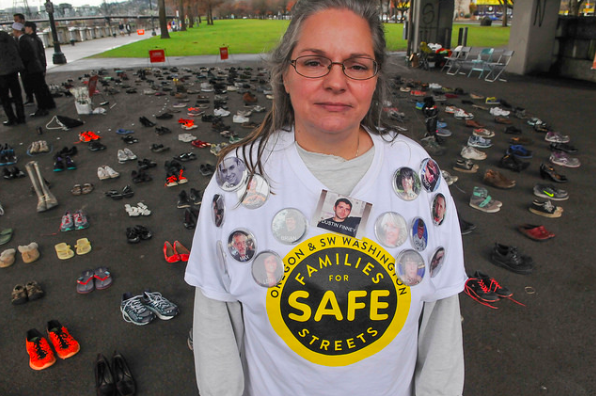
Sunday was the Day of Remembrance for Victims of Traffic Violence, which memorializes people killed in traffic.
In 2016, traffic deaths in America have continued an alarming upward trend, and are expected to reach about 35,000 by the end of the year. we are seeing an alarming spike in deaths. But statistics alone can numb us to the staggering human suffering they represent.
Jonathan Maus at Bike Portland was out Sunday at Portland's remembrance event, and he had a chance to talk to some people who have lost loved ones to traffic violence. He reports:
David Sale recalled the death of his 22-year-old daughter Danielle in 2010 with vivid details. Danielle was one of two people killed in 2010 when TriMet bus operator Sandi Day made an illegal and dangerous left turn and ran them over in a crosswalk on NW Broadway. “These are not accidents,” he said as he fought back tears.
Legacy Emanuel trauma nurse Mike Morrison sees this issue from a different perspective — from the mangled bodies and blood-stained clothing that gets rushed into his hospital rooms. Looking out over the 400 pairs of empty shoes, Morrison said, “We see nearly eight times this many people who are seriously injured every year.” Morrison said the focus should be on changing driving behavior and simply slowing down.
“What changes can we make so we don’t have another 400 shoes to look at?” he asked.
By their own adopted Vision Zero goals, the City of Portland says we can eliminate traffic deaths by 2025. That’s nine years from now — the same amount of time that has passed since Tracey Sparling was crushed to death by a right-turning truck operator who claimed he never even saw her.
Elsewhere on the Network today: Seattle Transit Blog reports that a state lawmaker is floating a proposal to make the Sound Transit Board a directly-elected body. Transport Providence makes the case against bi-partisan cooperation on Trump's $1 trillion infrastructure plan, which so far amounts to unnecessary tax breaks for contractors. And Transportation for America explains how some states are trying to reform out-dated transportation policies and strengthen funding for transportation.





